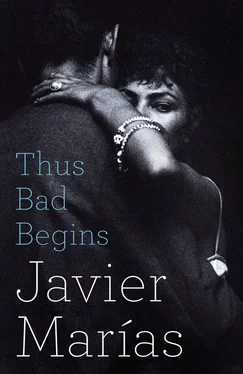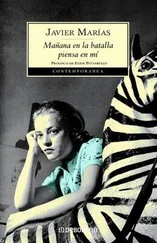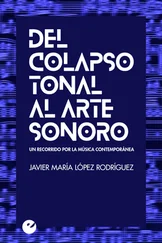Muriel got up from the floor and sat down at his desk, and I moved my chair so that I was facing him. He rested his cheek on one hand, rather than the other way round. As if his face had grown very heavy or as if he’d felt dizzy when he stood up, for he had done so far too suddenly, with no intermediate stage. However much you might want to limit or mete out what you say, it isn’t easy to apply the brakes once you’ve started, you always end up saying more than you intended, more than you wanted to. He spoke without looking at me, his head bent, his eye fixed on the correspondence on the desk, and which I had left for him to read when he felt like it or had time — none of it was urgent; if he was reading one of the letters now, he was doing so purely involuntarily, without taking in what was written or without caring.
‘Yes, a woman first, and then a few others,’ he said, perhaps not even quite aware that he was answering my question, that there was someone there listening and making a mental note. ‘A woman who deserves my complete confidence. A former friend, a former actress, although she wasn’t an actress when I met her, that came later —’ He paused, broke off, but sometimes the tongue gets swept along by its own wretched velocity. ‘A former love.’ He paused again, but this time succumbed even more easily to his tongue’s speed. ‘The love of my life, as people say. Or so I believed for a long time and, during that time, I always felt indebted to her. Which is why, now, when she reappeared, I felt obliged to take what she said seriously, not to doubt her word, but to believe her version of events. Holding back slightly, of course, trying to temper the shock she felt on learning of my friendship. What possible interest could she have in lying to me about the Doctor? To deprive me of an old friend? That wouldn’t have been much of a revenge, if she’d wanted to have her revenge for something that happened a long, long time ago and to which she gave her consent or that she at least understood, or so she said. “Do what you think you ought to do,” she said. “Do what will cause you least pain, what you’ll find easiest to live with. But never think of us, of you and me. Never think of us together if you don’t want to be filled with regret day after day and, still more, night after night. Never even think of us apart either, because, by remembering that, you’ll bring us together again,” that’s what she said, what she advised. And I took her advice, while I could. The other debt, the debt owed to Beatriz, would have weighed on me far more. At the time, I did all I could to do my duty: another of youth’s downsides, quite a few of which one leaves behind as one grows older. The trouble is that once you’ve taken those steps, there’s no going back when you finally discover what a fool you’ve been. The film has been shot and edited, the actors have dispersed along with the rest of the team, there’s no way of adding scenes or changing the plot or the ending: it is what it is and will be for ever. Far too many lives are shaped by deceit or error, it’s probably always been like that, so why should I be any different, why shouldn’t my life be the same? That thought gives me some consolation, convinces me that I’m not the only one — on the contrary, I’m just one more on an endless list of those who tried to act correctly, to keep their promises, those who prided themselves on being able to say something that sounds more and more like a piece of antiquated foolishness: “My word on it”, when almost no one honours their word any more, or considers it a virtue to do so …’ He fell silent, looked up from his papers and, seeing me, fixed his sharp eye on me. He had strayed from my question, had started remembering out loud. Not that he wasn’t aware of my presence or had forgotten I was there or had been pretending I wasn’t. It was more that he had momentarily lapsed into a soliloquy and didn’t care who was listening, like a character in a play when he’s on stage talking to himself, knowing that there’s no point in doing this unless the rest of us are listening. Now he did care and perhaps regretted what he’d said. He managed to use a prolonged silence to rein in that wretched, racing tongue of his. He looked at his watch. He tapped its face. And finally added: ‘I have to go to the hospital to relieve Susana. She spent all last night there. But let’s settle this once and for all, Juan: I find it highly unlikely that the Doctor would tell you of any vile deed he committed, unless you were to ignore my orders and continue to try to draw him out for your own satisfaction. I can’t stop you doing that. But if it happened, I don’t want you to tell me about it, to test my curiosity. Keep it to yourself, say nothing. It was hard for me to decide not to know, but after what happened two nights ago, that decision is now unshakable. Don’t tell anyone else either. A lot of vile deeds were committed here over many years, but we’ve managed to live with those who committed them, and some even did us favours too. We will have to live with them until we all die, and then everything will begin to even out and no one will bother trying to track down the perpetrators. It will be about as relevant to us as the Napoleonic era, which none of us experienced personally. It will be as if it had never happened or will sound to us like fiction. I’m only including myself in that “we” rhetorically, because I, too, will have to die. It’s still early days, I know and, as I say, many vile deeds were committed over many years, but in what age and in what country has that not been the case?’
It would be an exaggeration to describe what happened shortly afterwards as a vile deed. Of course, this all depends on one’s point of view, and, needless to say, the point of view of the person listening to or reading the story — which is, after all, the viewpoint of someone hearing a rumour, even if the teller of the tale swears he’s speaking from personal experience and that he either committed or participated in the act himself — never coincides with that of the person who experienced or created it. When we hear or read something, it always seems disappointing and trivial (‘Big deal’), just another story (‘So what else is new?’), an occurrence similar to so many others, almost predictable given that we’ve been inundated with stories ever since the first person spoke the first word to us; there are far too many stories in the world, and we’re rarely surprised or shocked by them or even interested, it’s as if everything had already happened in life or, if not, in the imagination, disseminated by innumerable printed pages and multiplying screens, the old screens of cinemas and televisions and the new ones of computers and even those of the ridiculous mobile phones that everyone now gazes into as if they were crystal balls, which, in a way, they are: they may not predict the future, but they do inform us about what didn’t exist and hadn’t even happened only a second before, about the new-born coming into existence all over the world, and sometimes they’re in such a hurry that they tell us things that haven’t happened, a fallacy, a calumny, a false rumour that proves hard to deny or to shake off; our level of credulity has reverted to what it was in the Middle Ages, with rumour still stuffing our ears with false reports — from the orient to the drooping west — and we refuse to ask for proof, accepting everything as credible because everything has already happened, or so we believe.
We become more and more like that ancient sentinel of our existence, the moon, for whom what came later and of which I was co-creator could never be considered a vile deed, merely another banal, hackneyed episode, incapable of rousing it from the tedium in which it has been condemned to live, night after night, since before the world was peopled; perhaps, who knows, the first men and women at least provided it with some novelty and amusement, until, inevitably, they began to repeat themselves. As I said earlier, though, perhaps the moon takes less notice of the battles and travails of the monotonous masses, the strutting and the shouting, and focuses more on those beings who seem to tiptoe through life, to be just passing through or on temporary loan even while they’re alive, those who will never go beyond their own bounds, those who one knows early on will leave no trace or track and will barely be remembered once they disappear (they will be like falling snow that does not settle, like a lizard climbing up a sunny wall in summer that pauses for a moment beneath the indolent eye that will not even notice it, like the words, all those years ago, that a teacher painstakingly wrote on the blackboard only to erase them herself at the end of the class, or leave them to be erased by the next teacher to occupy the room) and about whom not even their nearest and dearest will have any anecdotes to recount, for the moon knows that some of them might well harbour stories that are far odder and more intriguing, clearer and more personal than the stories of the shrill exhibitionists who fill most of the globe with their racket and exhaust it with their wild gesticulations.
Читать дальше












